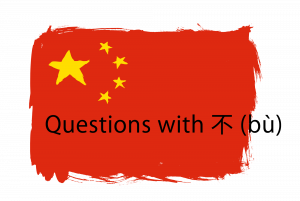Difference between revisions of "Language/Mandarin-chinese/Grammar/Questions-with-不-(bù)"
| Line 1: | Line 1: | ||
[[File:Questions with 不 (bù).png|thumb]] | |||
Closed interrogative questions in Chinese can also be formulated with <span class="notranslate">不 (bù)</span>. | Closed interrogative questions in Chinese can also be formulated with <span class="notranslate">不 (bù)</span>. | ||
| Line 23: | Line 25: | ||
Closed interrogative sentences await confirmation or acceptance of what has been said. | Closed interrogative sentences await confirmation or acceptance of what has been said. | ||
In English "isn't it?" or "OK?" are often used for closed interrogative sentences. | In English "isn't it?" or "OK?" are often used for closed interrogative sentences. | ||
==Examples== | ==Examples== | ||
Revision as of 15:35, 10 October 2020
Closed interrogative questions in Chinese can also be formulated with 不 (bù).
This is done by adding an affirmative-negative structure at the end of the sentence.
Structure
Verb + 不 + Verb
好 不 好 ?
對 不 對 ?/对 不 对 ?
是 不 是 ?
When placed before a falling tone character, 不 is read bú.
This expression can be attached to the end of a sentence to form a closed interrogative sentence.
Closed interrogative sentences await confirmation or acceptance of what has been said.
In English "isn't it?" or "OK?" are often used for closed interrogative sentences.
Examples
- 他們 來 不 來 ?/他们 来 不 来 ? (Tāmen lái bù lái?)
Are they going to come or not?
- 你 想 不 想 我 ? (Nǐ xiǎng bù xiǎng wǒ?)
Do you or do you not miss me?
- 我們 要 去 酒吧 , 你 去 不 去 ?/我们 要 去 酒吧 , 你 去 不 去? (Wǒmen yào qù jiǔbā, nǐ qù bú qù?)
We are going to the bar. Do you want to go?
- 我 去 買 咖啡 , 你 要 不 要 ?/我 去 买 咖啡 ,你 要 不 要 ? (Wǒ qù mǎi kāfēi, nǐ yào bú yào?)
I'm going to buy coffee. Do you want some?
- 我們 去 咖啡 店 ,好 不 好?/我们 去 咖啡 店 , 好 不 好 ? (Wǒmen qù kāfēi diàn, hǎo bù hǎo?)
Let's go to the cafe, OK?
- 他 是 你 的 老闆 , 對 不 對?/他 是 你 的 老板 , 对 不 对 ? (Tā shì nǐ de lǎobǎn, duì bú duì?)
It's your boss, is not it?
- 你 姓 王 , 是 不 是 ? (Nǐ xìng Wáng, shì bù shì?)
Your name is Wang, isn't it?
Sources
https://chine.in/mandarin/grammaire/ASG4D8XB
https://resources.allsetlearning.com/chinese/grammar/Affirmative-negative_question
